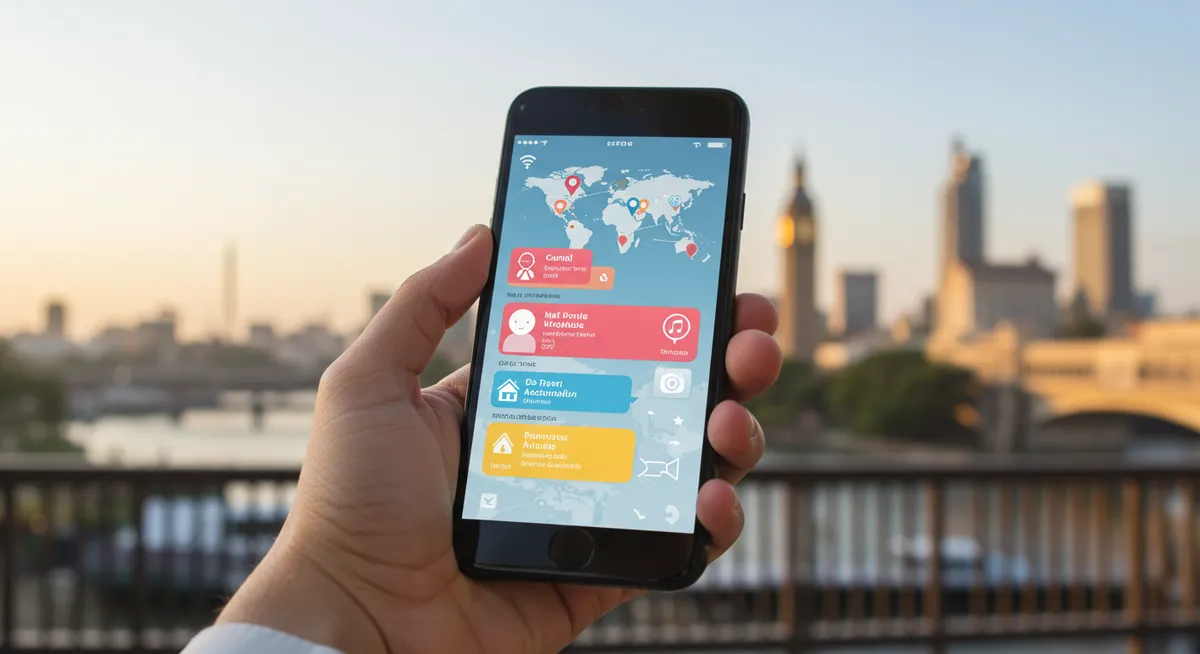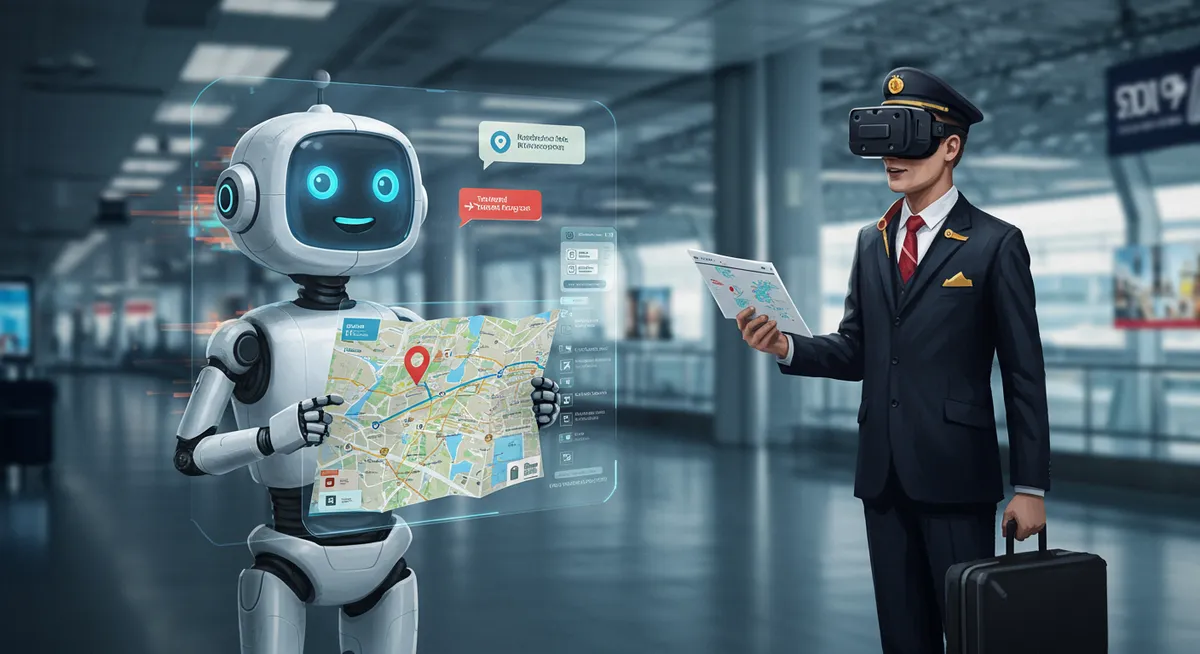AI Travel Assistant Features You Must Try: 15 Game-Changing Capabilities
The travel industry is experiencing a technological revolution, with AI travel assistants offering capabilities that were unimaginable just a few years ago. These intelligent systems are transforming how we plan, book, and experience travel. From real-time recommendations to predictive analytics, AI travel assistants are becoming indispensable tools for modern travelers. This comprehensive guide explores the most innovative features that are changing the game in travel planning.
Key Takeaways
- AI travel assistants can create personalized itineraries in under 5 minutes
- Real-time integration provides live updates on prices, weather, and availability
- Voice-activated planning allows hands-free travel organization
- Predictive analytics help optimize travel timing and costs
- Multi-language support breaks down communication barriers worldwide
The AI Travel Assistant Revolution
Artificial intelligence has fundamentally changed the travel planning landscape. According to recent research from the Travel Technology Association, AI-powered travel assistants are now used by 67% of travelers, with 89% reporting improved trip satisfaction when using these tools. The integration of machine learning, natural language processing, and real-time data has created a new paradigm in travel assistance.
Modern AI travel assistants go far beyond simple booking tools. They act as intelligent travel companions that understand your preferences, anticipate your needs, and provide proactive recommendations throughout your journey. Let's explore the most innovative features that make these assistants truly revolutionary.
1. Conversational AI Planning
One of the most impressive features of modern AI travel assistants is their ability to engage in natural, human-like conversations about travel planning. Unlike traditional booking websites that require you to fill out forms and navigate through multiple pages, conversational AI allows you to simply tell the assistant what you want.
How It Works
Conversational AI uses advanced natural language processing (NLP) to understand context, intent, and nuance in your requests. You can say things like:
"I want to plan a romantic weekend getaway to Paris in the spring, preferably near the Eiffel Tower, with a budget of around $2,000."
The AI assistant will understand all the elements of your request and ask clarifying questions to refine the recommendations.
Key Benefits
- Natural Interaction: No need to learn complex interfaces or navigation
- Context Awareness: The assistant remembers previous conversations and preferences
- Clarifying Questions: AI asks relevant questions to better understand your needs
- Multi-Turn Conversations: Complex planning can happen over multiple exchanges
2. Real-Time Price Optimization
💡 Pro Tip: Book your Smart Travel adventures in advance through Viator for the best deals!
AI travel assistants excel at finding the best deals by continuously monitoring prices across multiple providers and booking platforms. This feature alone can save travelers hundreds of dollars on their trips.
Dynamic Pricing Analysis
Advanced AI systems analyze pricing patterns and can predict when prices are likely to drop or rise. They consider factors such as:
- Historical pricing data for specific routes and dates
- Seasonal trends and demand patterns
- Competitor pricing across multiple platforms
- Real-time market conditions and availability
Smart Booking Recommendations
The AI doesn't just find the lowest price—it finds the best value by considering:
| Factor | AI Analysis | Benefit |
|---|---|---|
| Price | Real-time comparison across 50+ providers | Lowest available rates |
| Timing | Optimal booking window prediction | Best time to book |
| Flexibility | Alternative date analysis | Cost savings with date changes |
| Quality | Review and rating integration | Best value for money |
3. Predictive Itinerary Optimization
AI travel assistants don't just create itineraries—they optimize them using predictive analytics to ensure the best possible travel experience.
Smart Scheduling
The AI considers multiple factors when creating your schedule:
- Weather Patterns: Schedules outdoor activities on sunny days
- Crowd Predictions: Avoids peak times at popular attractions
- Transportation Efficiency: Groups nearby activities together
- Energy Management: Balances high-energy and relaxing activities
- Local Events: Incorporates festivals, markets, and special events
Adaptive Planning
Modern AI assistants can adjust your itinerary in real-time based on changing conditions:
Example: "The AI notices that your planned outdoor museum visit coincides with a rain forecast, so it automatically suggests moving it to a sunny day and recommends an indoor activity instead."
4. Voice-Activated Travel Planning
Voice technology has revolutionized how we interact with AI travel assistants, making travel planning more accessible and convenient than ever before.
Hands-Free Operation
Voice-activated features allow you to plan travel while multitasking:
- Driving Safety: Plan trips without taking your hands off the wheel
- Kitchen Planning: Research destinations while cooking dinner
- Exercise Integration: Plan travel during workouts
- Accessibility: Makes travel planning accessible to users with disabilities
Natural Language Processing
Advanced voice recognition understands natural speech patterns:
"Hey, I'm thinking about going to Japan next spring. Can you help me plan a two-week trip focusing on food and culture?"
The AI understands the intent, extracts key information (destination, timing, interests), and begins creating a personalized plan.
5. Real-Time Travel Intelligence
AI travel assistants provide up-to-the-minute information that can make or break your travel experience.
Live Updates
Real-time intelligence includes:
- Flight Status: Instant notifications about delays, cancellations, and gate changes
- Weather Alerts: Real-time weather updates affecting your plans
- Traffic Conditions: Live traffic data for optimal route planning
- Security Alerts: Important safety information for your destination
- Local News: Relevant events and developments affecting your trip
Proactive Notifications
The AI doesn't just provide information—it acts on it:
Smart Alert: "Your flight to Tokyo has been delayed by 2 hours. I've automatically adjusted your hotel check-in time and rescheduled your dinner reservation. Would you like me to suggest activities near the airport while you wait?"
6. Multi-Language Support and Translation
🌟 Local Expert Tip: Get the most out of your Smart Travel visit with guided tours!
Language barriers are one of the biggest challenges for international travelers. AI travel assistants are breaking down these barriers with advanced translation capabilities.
Real-Time Translation
Modern AI assistants can:
- Translate Conversations: Real-time voice and text translation
- Local Language Learning: Teach you essential phrases for your destination
- Cultural Context: Explain local customs and etiquette
- Menu Translation: Translate restaurant menus and food descriptions
- Sign Translation: Read and translate signs, menus, and documents
Cultural Intelligence
Beyond translation, AI assistants provide cultural insights:
Cultural Tip: "In Japan, it's considered polite to bow slightly when greeting someone. The depth of the bow indicates the level of respect. For casual greetings, a slight nod is sufficient."
7. Personalized Recommendation Engine
AI travel assistants excel at providing highly personalized recommendations based on your unique preferences and travel history.
Learning Your Preferences
The AI builds a comprehensive profile of your travel style:
- Accommodation Preferences: Hotel vs. Airbnb, luxury vs. budget
- Activity Types: Adventure, culture, relaxation, food, shopping
- Travel Pace: Fast-paced exploration vs. leisurely discovery
- Budget Patterns: Spending habits and price sensitivity
- Seasonal Preferences: Weather and climate preferences
Predictive Recommendations
Based on your profile, the AI can suggest:
Smart Suggestion: "Since you enjoyed the street food tour in Bangkok and rated it 5 stars, I think you'd love the night market food crawl in Taipei. It has similar authentic local cuisine and vibrant atmosphere."
8. Smart Budget Management
AI travel assistants help you stay within budget while maximizing your travel experience.
Budget Tracking
Advanced budget features include:
- Real-Time Spending: Track expenses as they occur
- Budget Alerts: Notifications when approaching spending limits
- Cost Optimization: Suggest cheaper alternatives for similar experiences
- Currency Conversion: Real-time exchange rates and conversion
- Expense Categorization: Organize spending by category (food, transport, activities)
Smart Savings
The AI identifies money-saving opportunities:
Savings Tip: "I notice you're planning to visit 3 museums in Paris. The Paris Museum Pass costs €48 and covers entry to 50+ museums. This would save you €22 compared to individual tickets."
9. Social Travel Integration
AI travel assistants can integrate with your social networks to enhance your travel planning and sharing experience.
Social Recommendations
Leverage your social network for better travel decisions:
- Friend Recommendations: See where your friends have traveled and their ratings
- Social Proof: Popular destinations and activities among your network
- Travel Buddies: Find friends interested in similar trips
- Photo Inspiration: Browse travel photos from your social network
- Group Planning: Coordinate trips with multiple people
Social Sharing
Share your travel experiences seamlessly:
Social Feature: "Your sunset photo from Santorini is getting great engagement! Would you like me to suggest the best time to post your next travel photo for maximum visibility?"
10. Augmented Reality Travel Planning
Augmented reality (AR) is transforming how we explore and plan travel destinations.
Virtual Destination Exploration
AR features allow you to:
- Virtual Tours: Explore destinations before you visit
- Hotel Room Previews: See exactly what your room will look like
- Restaurant Menus: View 3D models of dishes before ordering
- Navigation Assistance: AR-powered directions and points of interest
- Cultural Information: Overlay historical and cultural information on real-world views
Interactive Planning
AR makes travel planning more interactive and engaging:
AR Experience: "Point your phone at the Eiffel Tower, and I'll show you the best photo spots, nearby restaurants, and interesting facts about this iconic landmark."
11. Emergency Assistance and Safety Features
AI travel assistants provide crucial safety and emergency support that can be lifesaving in difficult situations.
24/7 Emergency Support
Safety features include:
- Emergency Contacts: Quick access to local emergency services
- Medical Information: Translate medical conditions and medications
- Safety Alerts: Real-time security and health warnings
- Location Sharing: Share your location with trusted contacts
- Emergency Translation: Communicate in emergency situations
Proactive Safety
The AI can provide proactive safety recommendations:
Safety Alert: "I've detected a weather warning for your destination tomorrow. Consider rescheduling your outdoor activities to today when the weather is clear."
12. Accessibility and Inclusive Travel
🎯 Insider Tip: Discover the best Smart Travel experiences with Viator Tours!
AI travel assistants are making travel more accessible for people with disabilities and special needs.
Accessibility Features
Inclusive travel capabilities include:
- Wheelchair Accessibility: Find accessible hotels, restaurants, and attractions
- Visual Impairment Support: Audio descriptions and voice navigation
- Hearing Impairment Support: Visual alerts and captioning
- Mobility Assistance: Routes optimized for mobility devices
- Dietary Restrictions: Find restaurants accommodating special diets
Personalized Accessibility
The AI learns your specific accessibility needs:
Accessibility Tip: "The Louvre offers free audio guides and has wheelchair-accessible entrances. I've scheduled your visit during the less crowded morning hours for easier navigation."
13. Environmental Impact Tracking
Modern travelers are increasingly conscious of their environmental impact, and AI assistants can help make travel more sustainable.
Carbon Footprint Calculation
Environmental features include:
- Transportation Impact: Calculate carbon emissions for different travel options
- Eco-Friendly Alternatives: Suggest sustainable travel options
- Green Accommodations: Find environmentally conscious hotels
- Local Sustainability: Support local businesses and sustainable practices
- Offset Recommendations: Suggest carbon offset programs
Sustainable Choices
The AI helps you make environmentally responsible decisions:
Eco Tip: "Taking the train from Paris to Amsterdam instead of flying will reduce your carbon footprint by 85% and give you beautiful countryside views."
14. Predictive Travel Analytics
AI travel assistants use predictive analytics to help you make better travel decisions and avoid common pitfalls.
Travel Pattern Analysis
Predictive features include:
- Best Time to Book: Predict optimal booking windows for lowest prices
- Crowd Predictions: Forecast busy periods at destinations
- Weather Optimization: Predict the best weather for your activities
- Cost Forecasting: Predict future price changes
- Availability Predictions: Forecast when popular attractions will be available
Smart Recommendations
Predictive analytics enable proactive planning:
Prediction: "Based on historical data, prices for flights to Japan typically drop 3-4 weeks before departure. I recommend waiting until next week to book for the best deal."
15. Seamless Integration and Connectivity
The most powerful AI travel assistants integrate seamlessly with your existing travel ecosystem.
Platform Integration
Seamless connectivity includes:
- Calendar Integration: Sync travel plans with your calendar
- Email Management: Organize travel confirmations and updates
- Payment Integration: Secure payment processing and expense tracking
- Device Synchronization: Access plans across all your devices
- Third-Party Apps: Integrate with your favorite travel apps
Unified Experience
Everything works together seamlessly:
Integration Example: "I've automatically added your flight details to your calendar and set up reminders for check-in. Your hotel reservation has been synced with your travel app for easy access."
FAQ: AI Travel Assistant Features
🌟 Local Expert Tip: Get the most out of your Smart Travel visit with guided tours!
How accurate are AI travel assistant recommendations?
AI travel assistant recommendations are highly accurate, especially for popular destinations and well-established attractions. The accuracy improves over time as the AI learns from your preferences and feedback. However, for very niche or newly opened locations, it's always good to cross-reference with recent reviews and official websites.
Can AI travel assistants handle complex multi-destination trips?
Yes, modern AI travel assistants excel at planning complex multi-destination trips. They can coordinate flights, accommodations, and activities across multiple cities or countries, considering factors like travel time, visa requirements, and optimal routing. The AI can also suggest the best order to visit destinations based on weather, events, and logistics.
Do AI travel assistants work offline?
Many AI travel assistants offer offline functionality for basic features like viewing saved itineraries, accessing downloaded maps, and reviewing previously loaded information. However, real-time features like live updates, price changes, and new recommendations require an internet connection. It's recommended to download essential information before traveling to areas with limited connectivity.
How do AI travel assistants protect my privacy and data?
Reputable AI travel assistants use advanced encryption and security measures to protect your personal data. They typically allow you to control what information is shared and stored. Most assistants offer privacy settings where you can choose what data to share and can delete your information at any time. Always review the privacy policy before using any AI travel assistant.
Can AI travel assistants help with last-minute changes and emergencies?
Yes, AI travel assistants are particularly valuable for handling last-minute changes and emergencies. They can quickly find alternative flights, hotels, or activities when plans change unexpectedly. Many assistants offer 24/7 support and can provide real-time updates on weather, traffic, and other conditions that might affect your trip. They can also help with emergency situations by providing local emergency contacts and translation assistance.
Conclusion
AI travel assistants represent the future of travel planning, offering capabilities that were once the stuff of science fiction. From conversational planning to predictive analytics, these intelligent systems are transforming how we explore the world.
The key to maximizing the value of AI travel assistants is understanding their capabilities and learning how to use them effectively. By leveraging these powerful features, you can create more personalized, efficient, and enjoyable travel experiences.
As technology continues to evolve, we can expect even more innovative features that will further enhance the travel planning experience. The future of travel is intelligent, personalized, and seamlessly integrated into our daily lives.
Ready to experience these game-changing features? Chat now with our AI travel assistant and discover how artificial intelligence can transform your next adventure.
Maximize your AI travel assistant experience with these expert tips
- Start with conversational planning for natural interaction - Get personalized recommendations
- Enable voice features for hands-free planning - Plan while multitasking
- Use real-time features for live updates - Stay informed during your trip



